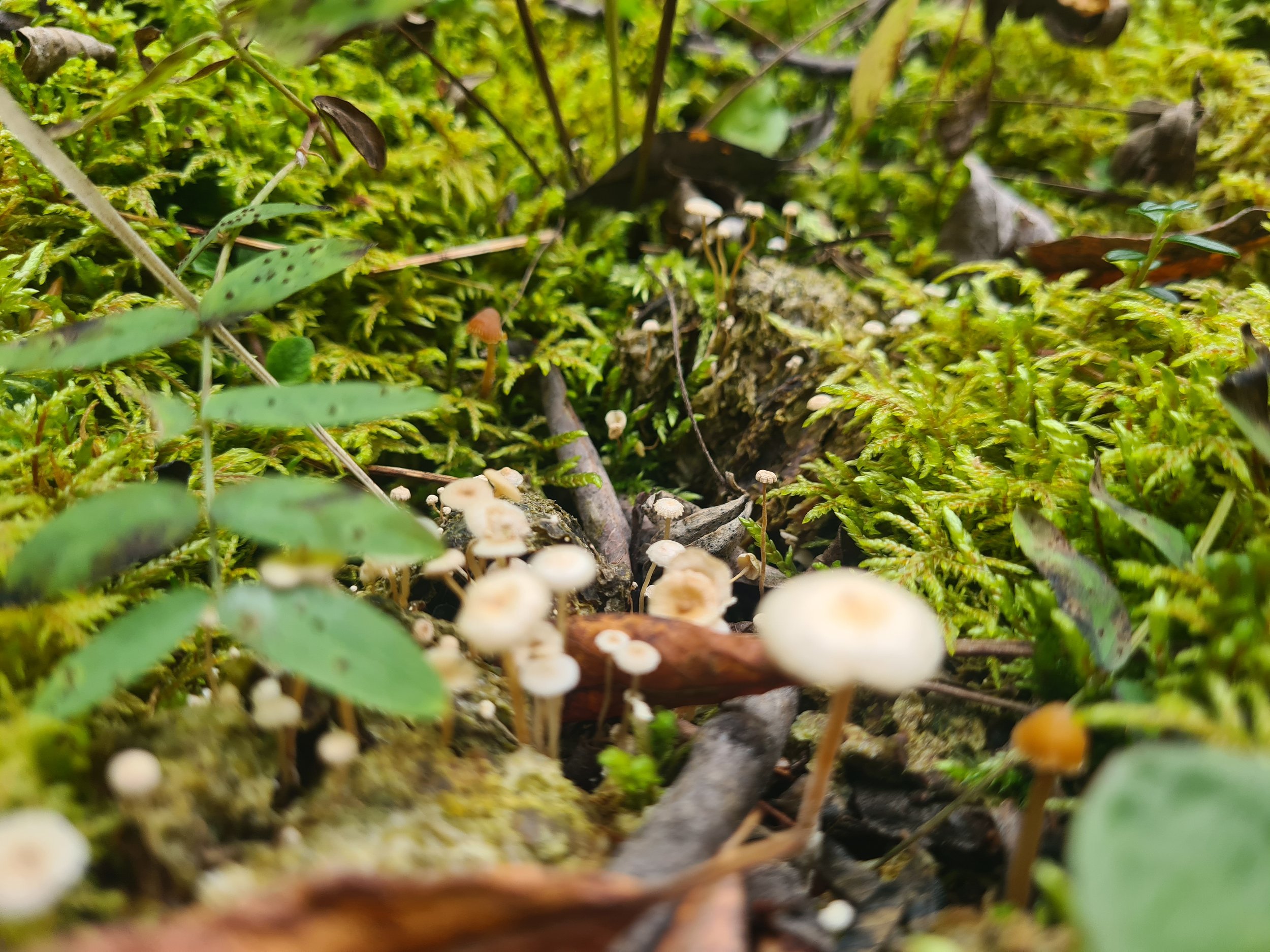
“There is a lot of healing that needs to happen at Faro. Plants are already doing this work, but it is hard because they can become contaminated. We need to work as hard as them and see this as a relationship. We need to treat the plants as relatives. They are part of what we breathe, a part of us—every plant that goes in the ground is a relationship.” - Kaska Elder
What is the community-based revegetation strategy?
In 2020, Dena Cho began working on the revegetation program at the Faro Mine with Integral Ecological Group (IEG). Together, we developed a community-based revegetation strategy to help boost Ross River Dena involvement in the remediation efforts at the mine site.
Who was involved in these programs and what are some of the program details?
In 2021, Dena Cho hired 19 Kaska Dena, 13 youth and 6 Elders from Ross River, to plant 36,000 ts’ū (white spruce) and gą̄dze (lodgepole pine) seedlings.
In 2022, Dena Cho hired 9 Kaska Dena youth and 4 Elders to plant 24,000 ts’ū (spruce), gą̄dze (pine) and chebā (trembling aspen) seedlings. We also had 6 Elders come to Faro for a day to tour the site, talk to youth about the history of Tsē Zūl area, and check in on the tree planting work. Also, we expanded the community-based revegetation strategy to include a seed collection and vegetation sampling program.
In January 2023, Dena Cho toured NATS Nursery in Langley, BC, and the Ministry of Environment Lab in Victoria, BC. In June 2023, we hired 10 Kaska youth, 6 Elders, and several support staff for the tree planting program—the seed collection and vegetation sampling programs employed 7 Kaska youth and 6 Elders. This year, we planted 27,940 seedlings.
From 2021 to 2023, the Kaska Dena have planted 92,298 seedlings at the mine site, consisting of 90,818 tree seedlings and 1,480 locally-sourced herb and shrub seedlings. In 2024, we aim to plant 25,000 to 30,000 seedlings.
What are the seed collection programs and vegetation programs about?
The plants collected for the seed collection program will be used for future revegetation projects at the Faro Mine. Working with Elders, we chose species for seed collection based on plants thought to be suitable for future revegetation. For metals uptake monitoring, we chose plant species for sampling that are both abundant on the Faro Mine site and in the surrounding area and that are identified as potentially important indicators for metal contamination. For the first year of these programs, we hired 3 Kaska youth and worked with 10 Elders across four different areas within Kaska territory.
Who are your project partners?
Our partners in the tree planting program included Ross River Dena Council, Wildside Reforestation, and IEG with support from Crown-Indigenous Relations and Northern Affairs Canada.
How are Kaska values included in these programs?
Both the 2021 and 2022 tree planting programs began with a welcoming gathering at Blind Creek, a traditional fish camp location that holds great importance to the Dena. It is an act of perseverance and reoccupation of culturally specific areas. The 2022 seed collection and vegetation sampling programs began with a day of training from Elders and ecologists in Ross River. Elders involved in the project taught the group about Kaska teachings, language, and protocols (e.g., prayers, giving thanks and offerings) to help strengthen our connection to the land. Ceremonies about water and plants are part of these programs as well.
What is being planned to continue and grow these community projects?
We are very proud of the youth who worked so hard on these programs. These tree planting programs are the largest tree planting initiatives in Yukon, to date! So, we plan to continue with these revegetation efforts by planting trees, sampling vegetation, and seed collections. Dena Cho is also looking into wildlife monitoring and finding other areas where we can include Ross River Dena members. Moreover, all these efforts have led Dena Cho and our project partners to develop a Tsē Zūl Land Care Plan with the Ross River Dena Council. The Tsē Zūl Land Care Plan aims to provide direct input of Kaska values by providing remediation goals and objectives with the intent of strengthening and restoring Dena relationship with the Tsē Zūl/Faro region.
Sógá sénlá' to those who supported these various programs.
2021 Photo Gallery

Faro mine orientation and safety meeting (June 2021)

Blind Creek welcome to the project gathering (June 2021)

Kaska ways of knowing by Elders Dorothy and Mary (June 2021)

Faro mine tour (June 2021)

Kaska ways of knowing by Elders Dorothy and Mary (June 2021)

Tree planters learning about revegetation techniques and soil science (June 2021)

Justin Straker from IEG teaching about soils at Van Gorda (June 2021)
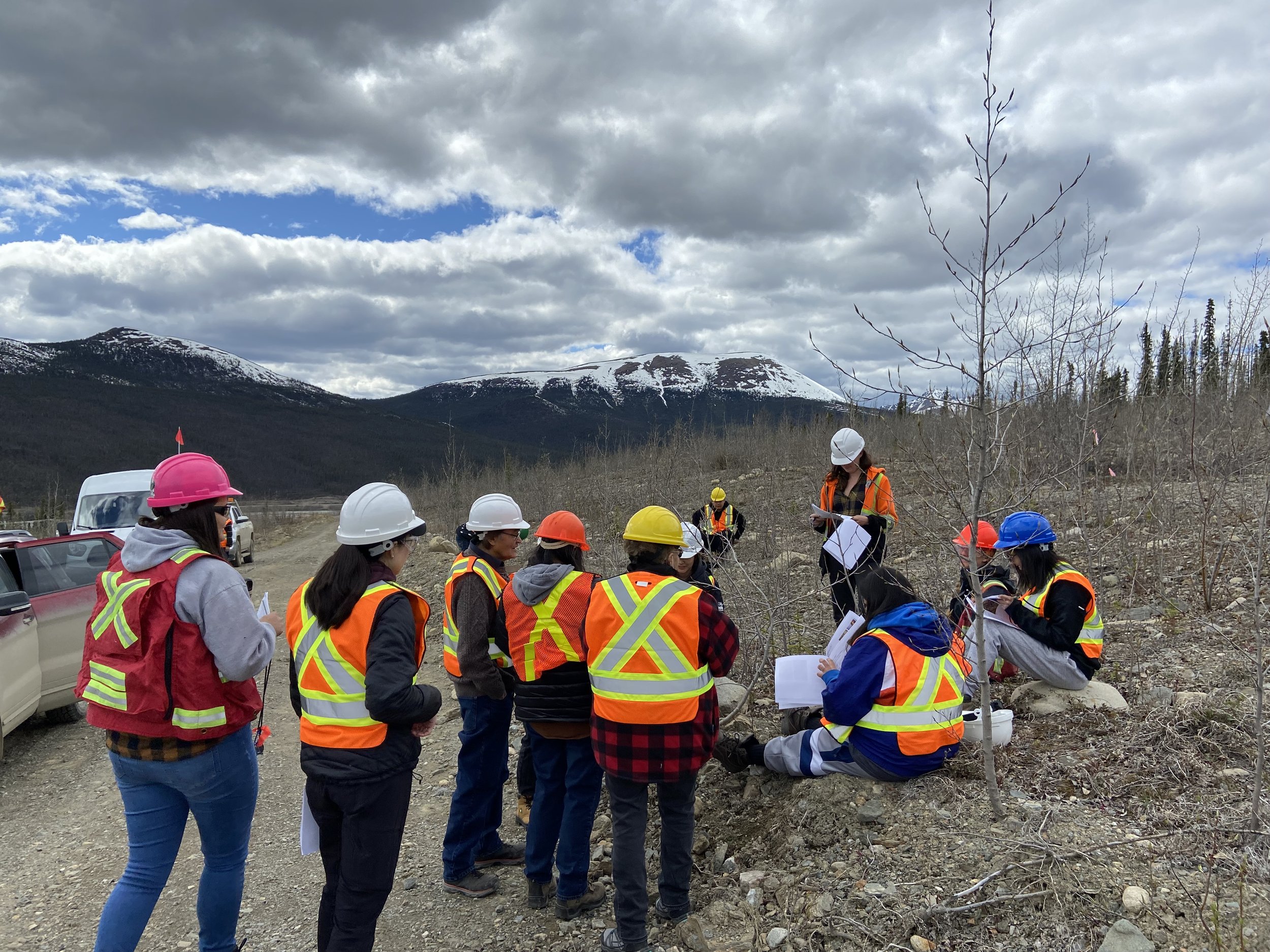
Kaska language and plant identification (June 2021)

Elder Mary Maje planting the first tree (June 2021)

Day 1 of tree planting (June 2021)

Jasmine Tom planting a row of trees (June 2021)

Dena Cho's Jody Inkster planting a tree (June 2021)
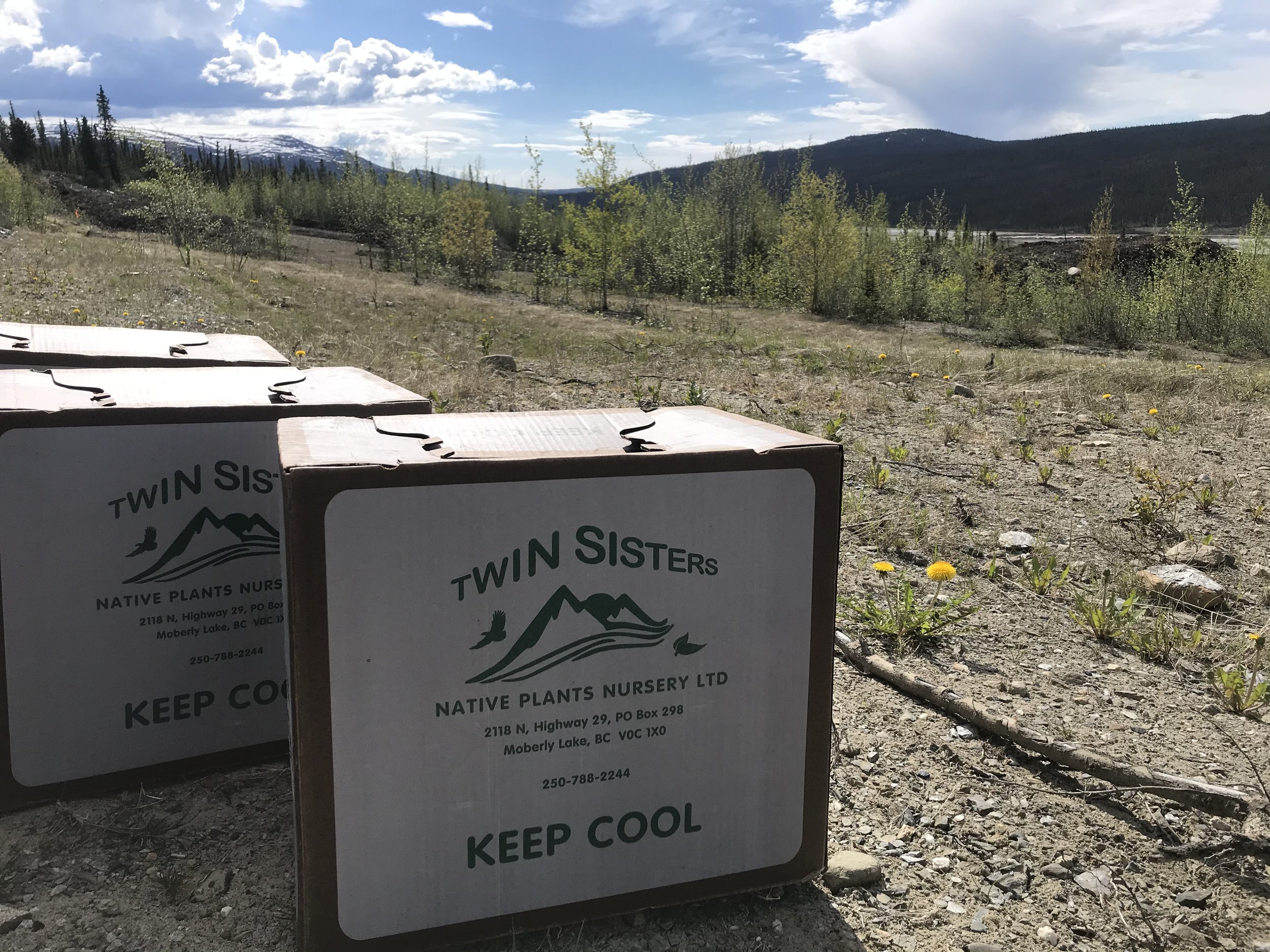
Trees grown at Twin Sisters (June 2021)

Jeremiah Shorty planting trees (June 2021)

Elder Kathlene Suza planting a tree (June 2021)

Elder Dorothy Smith planting trees in the rain (June 2021)

Let's plant (June 2021)

Elder Ted Charlie planting trees (June 2021)
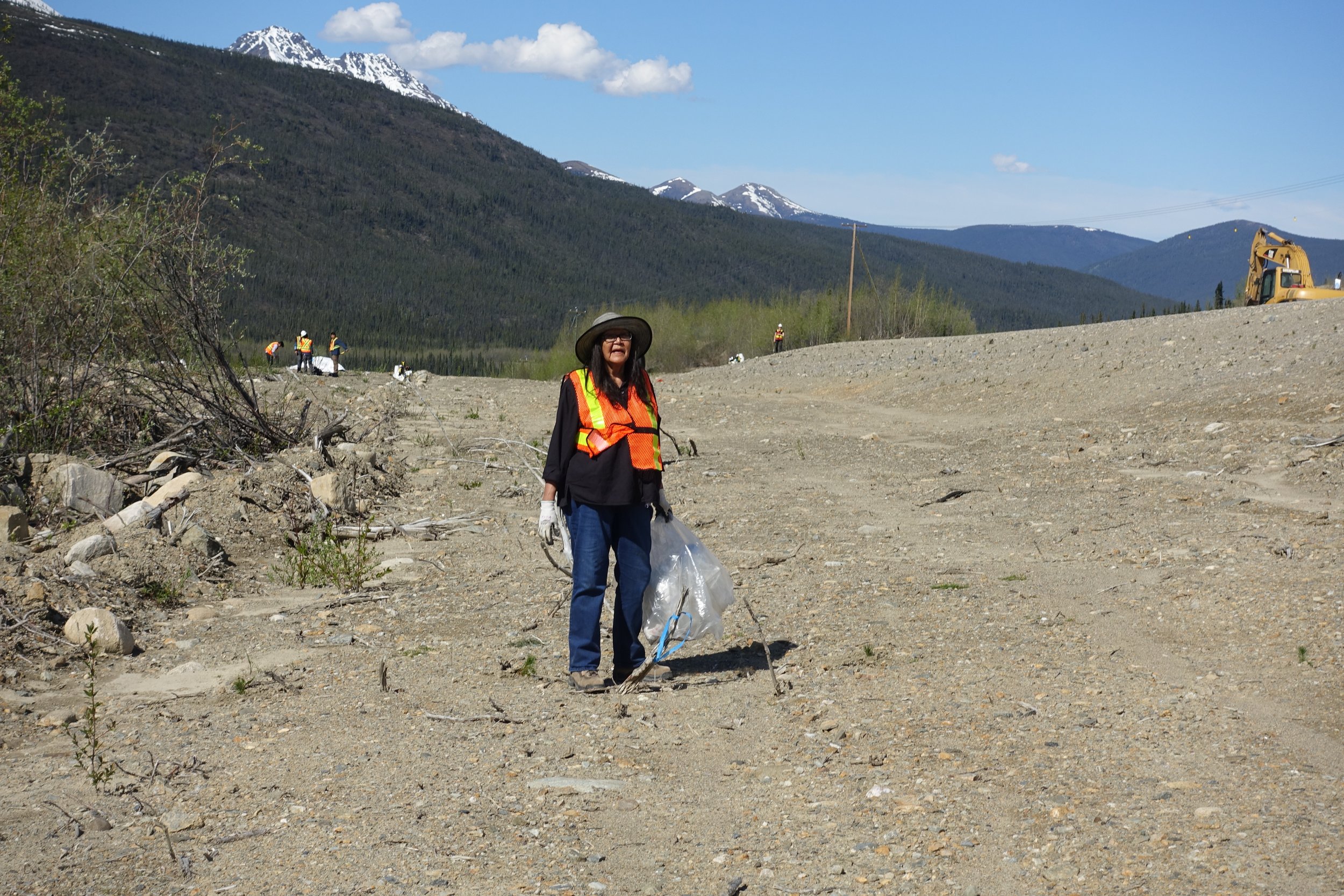
Elder Mary Maje planting trees (June 2021)
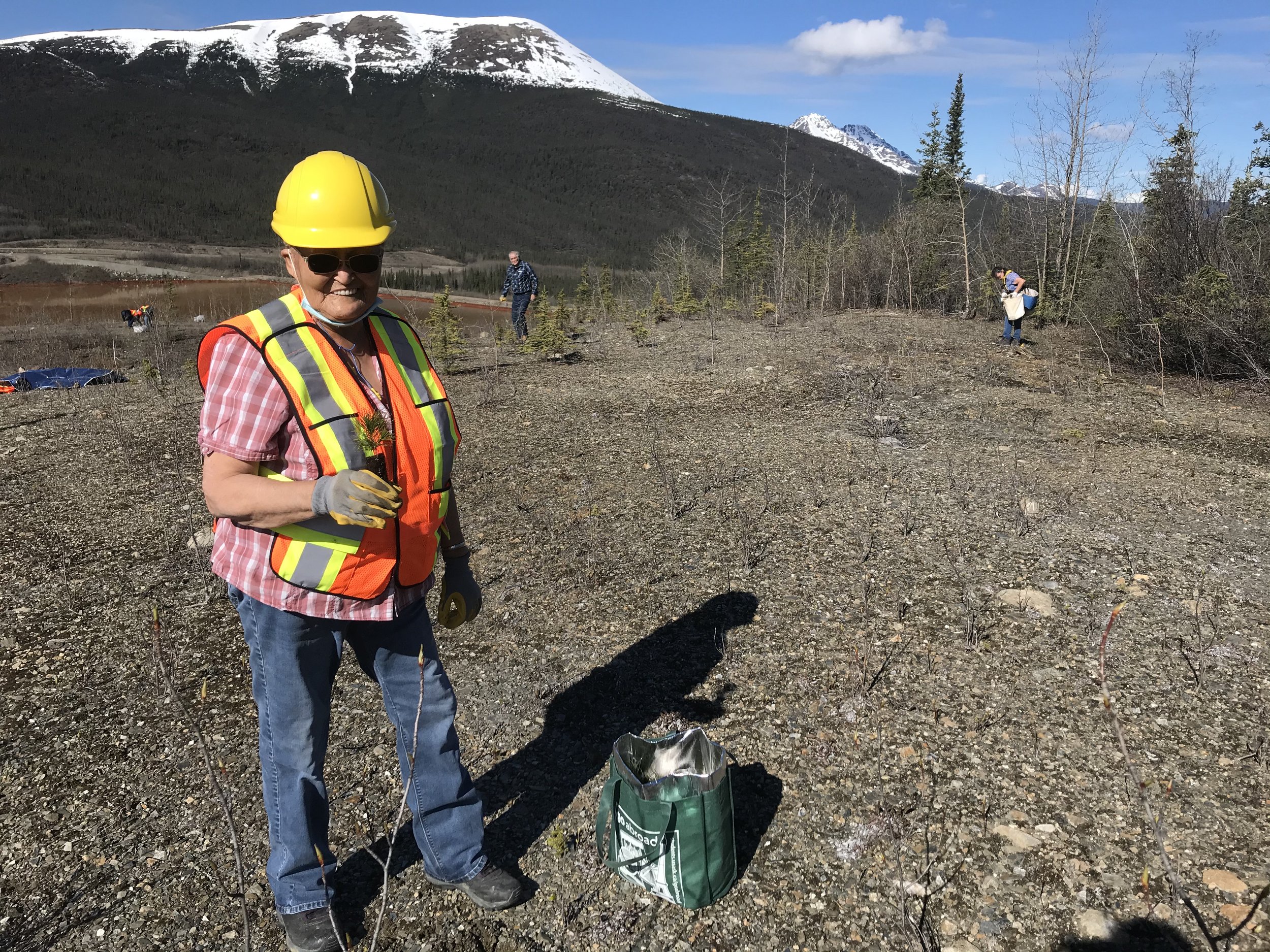
Elder Dorothy Smith ready to plant (June 2021)

Cassia planting a baby tree (June 2021)
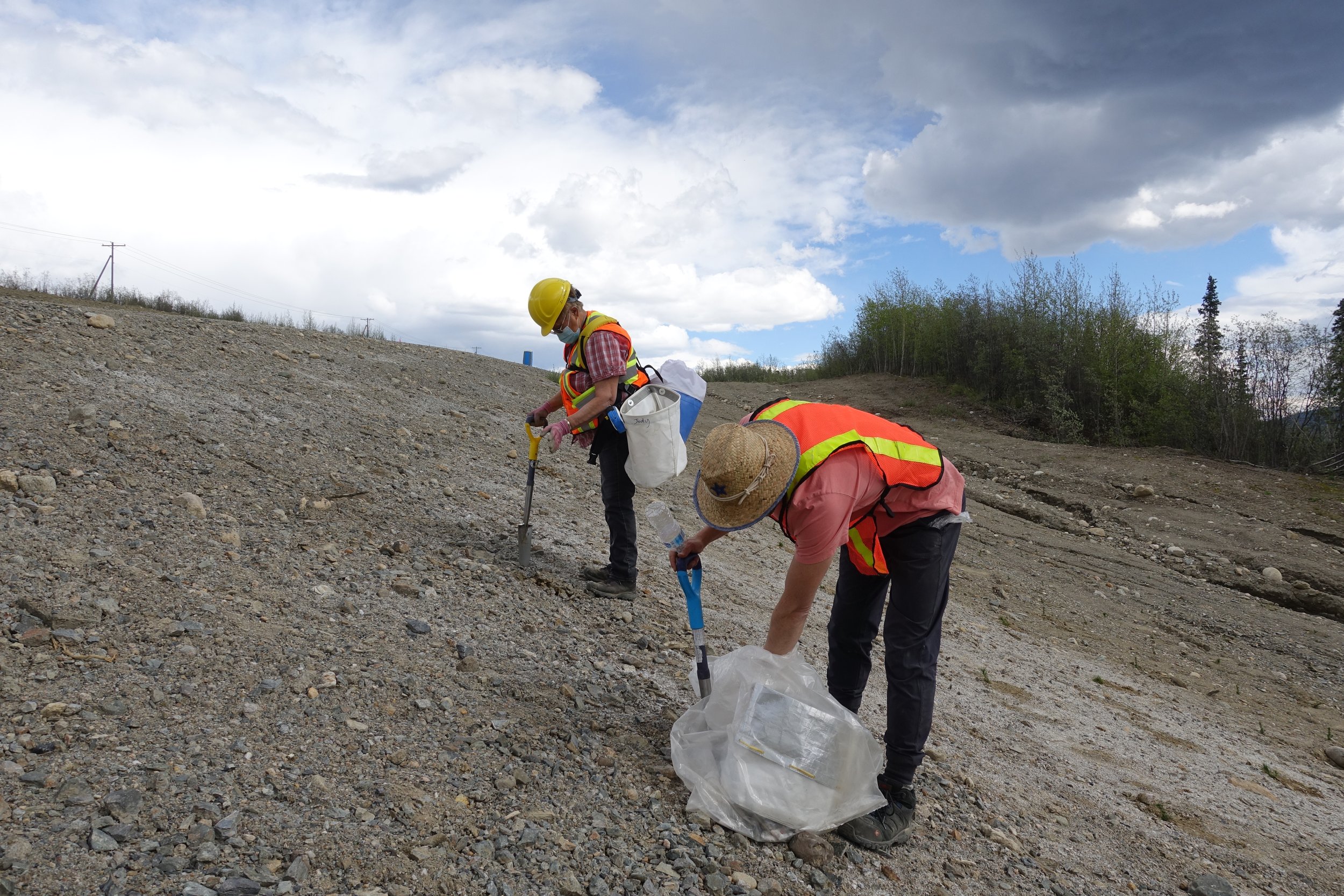
Elder Dorothy Smith and Wildside Reforestation's Colin Dorward working on a slope (June 2021)

IEG shows how to measure tree densities (June 2021)

Reclamation research in progress (June 2021)

Tree planters enjoying the outdoors at Blind Creek (June 2021)
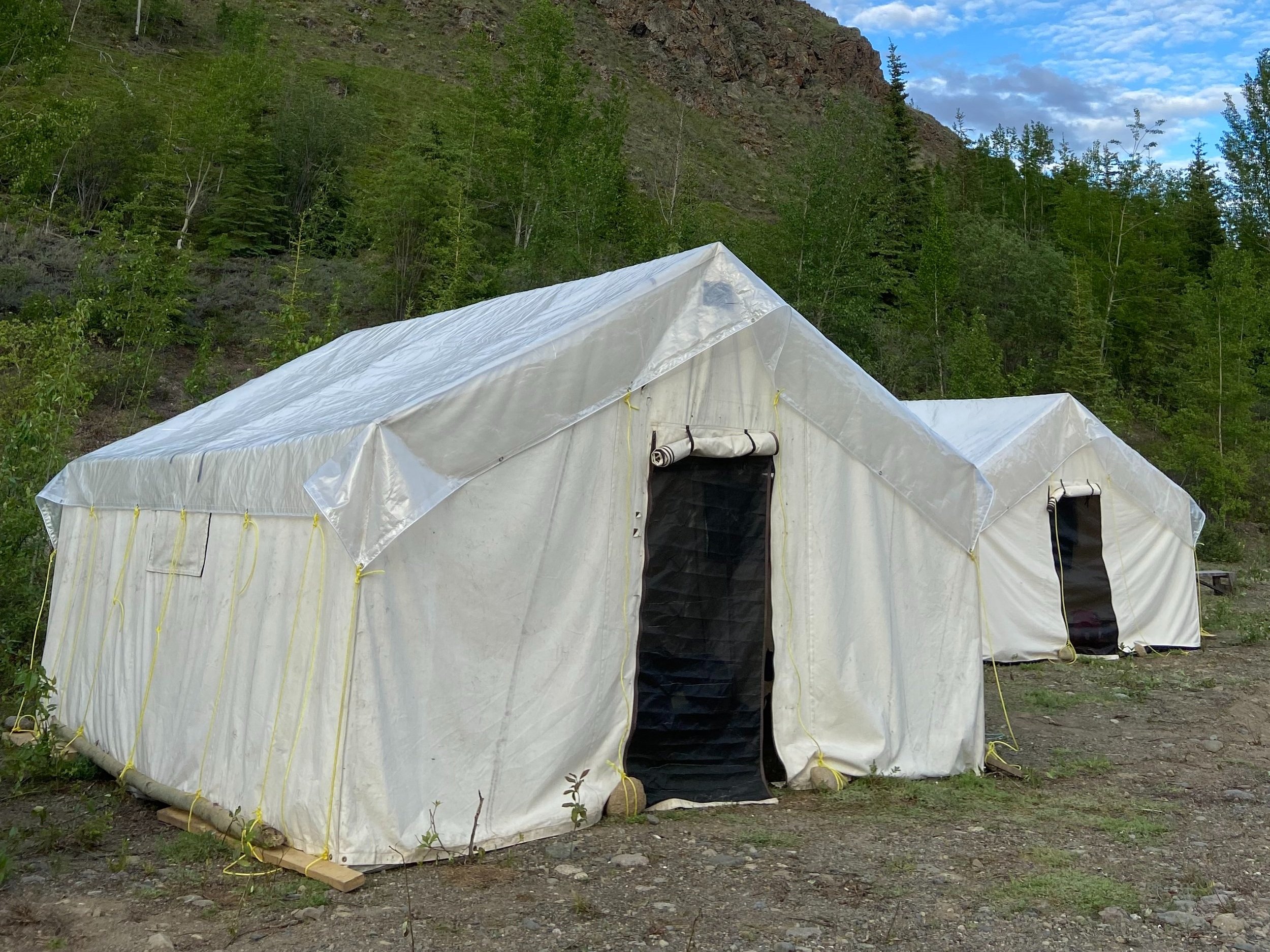
Blind Creek camp set up (June 2021)

Group photo on the last day (June 2021)

Shelley Inkster planting a tree (June 2021)
2022 Photo Gallery

Unloading seedlings at Faro mine (June 2022)

24,000 seedlings stacked and ready to be planted (June 2022)

Wildside Reforestation Thor Stewart welcoming everyone to the second year of tree planting (June 2022)
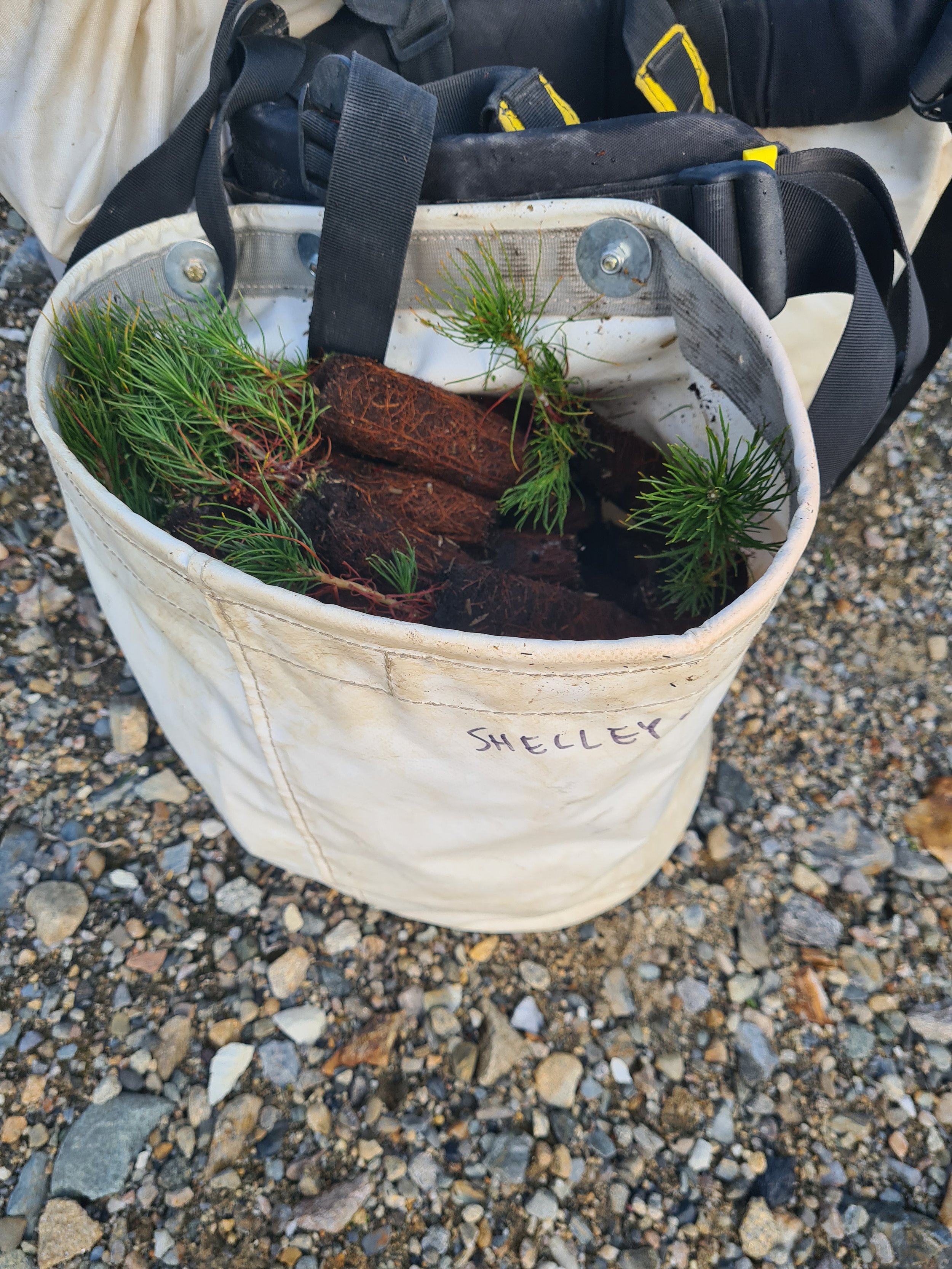
Full tree planting bags and many hours of work (June 2022)
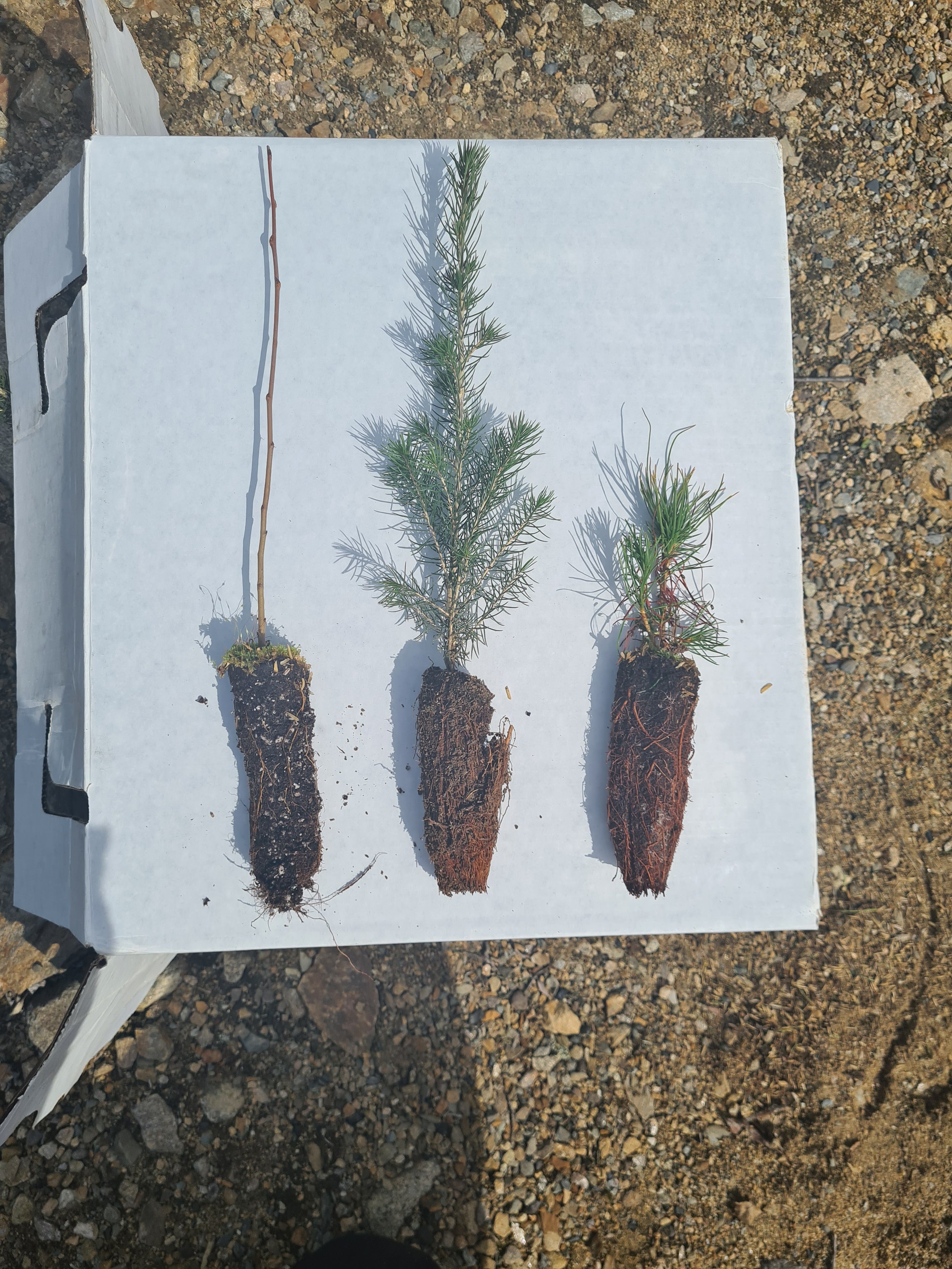
Species from left to right: Choba (aspen), ts'u (spruce), and gadze (lodgepole pine) (June 2022)

Camille Jakesta planting a seedling (June 2022)
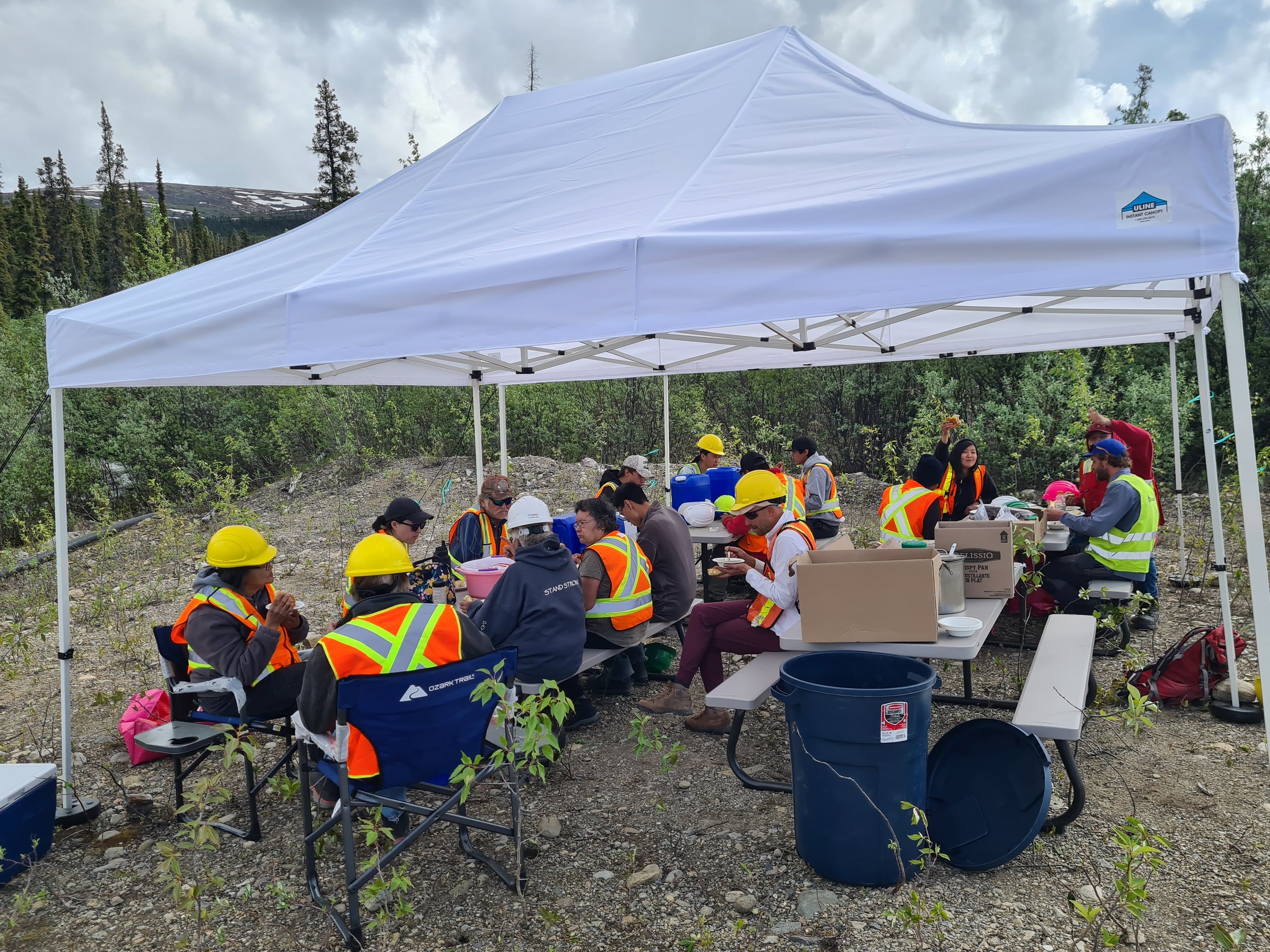
Enjoying stew and bannock with the tree planting crew (June 2022)

Planting in pairs to finish off a rocky section (June 2022)
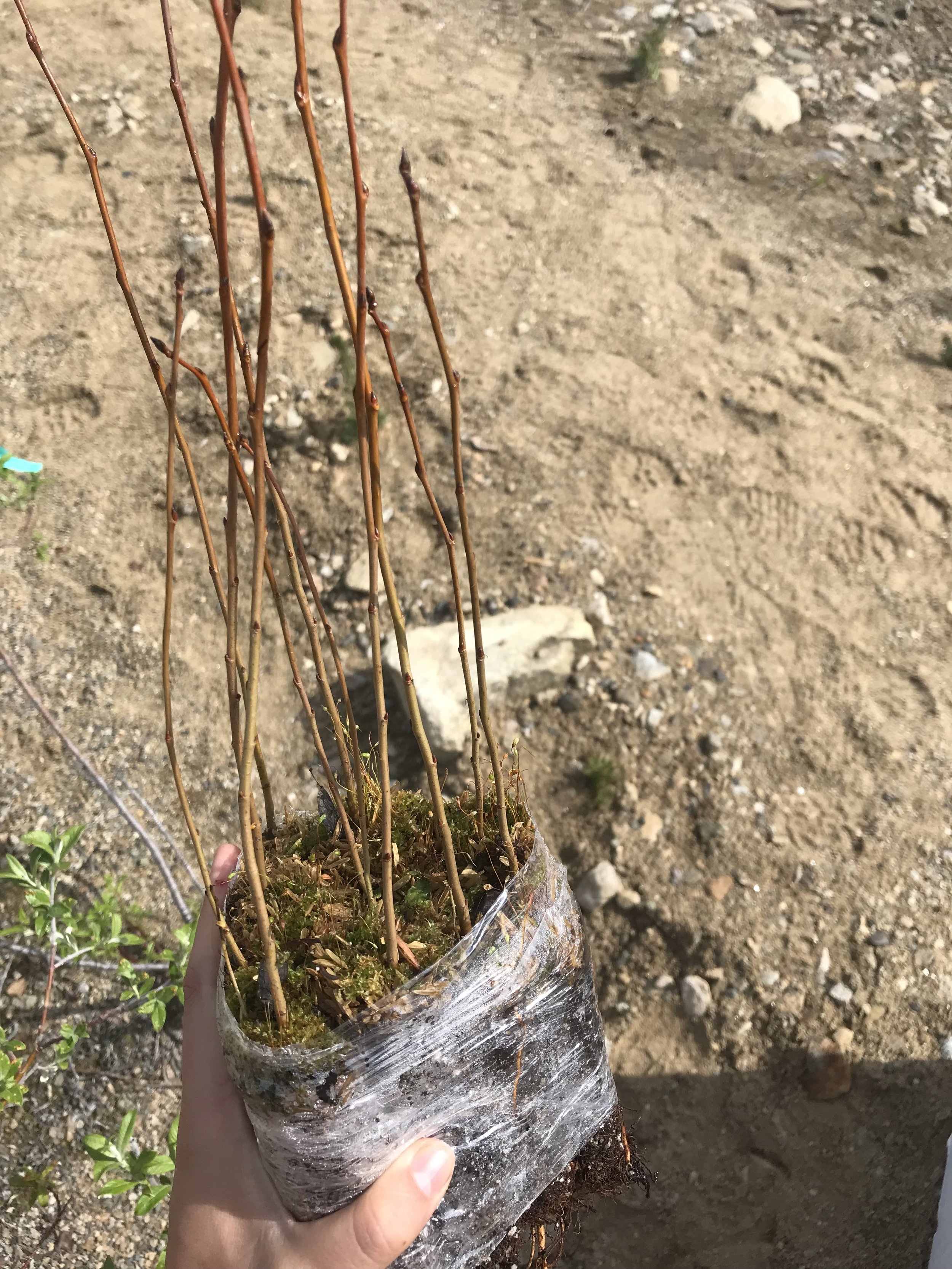
A detailed glance of a new species added this year: Choba (aspen) (June 2022)

Seedlings planted in the ground (June 2022)

Jasmine Tom planting a ts'u (spruce) seedling (June 2022)
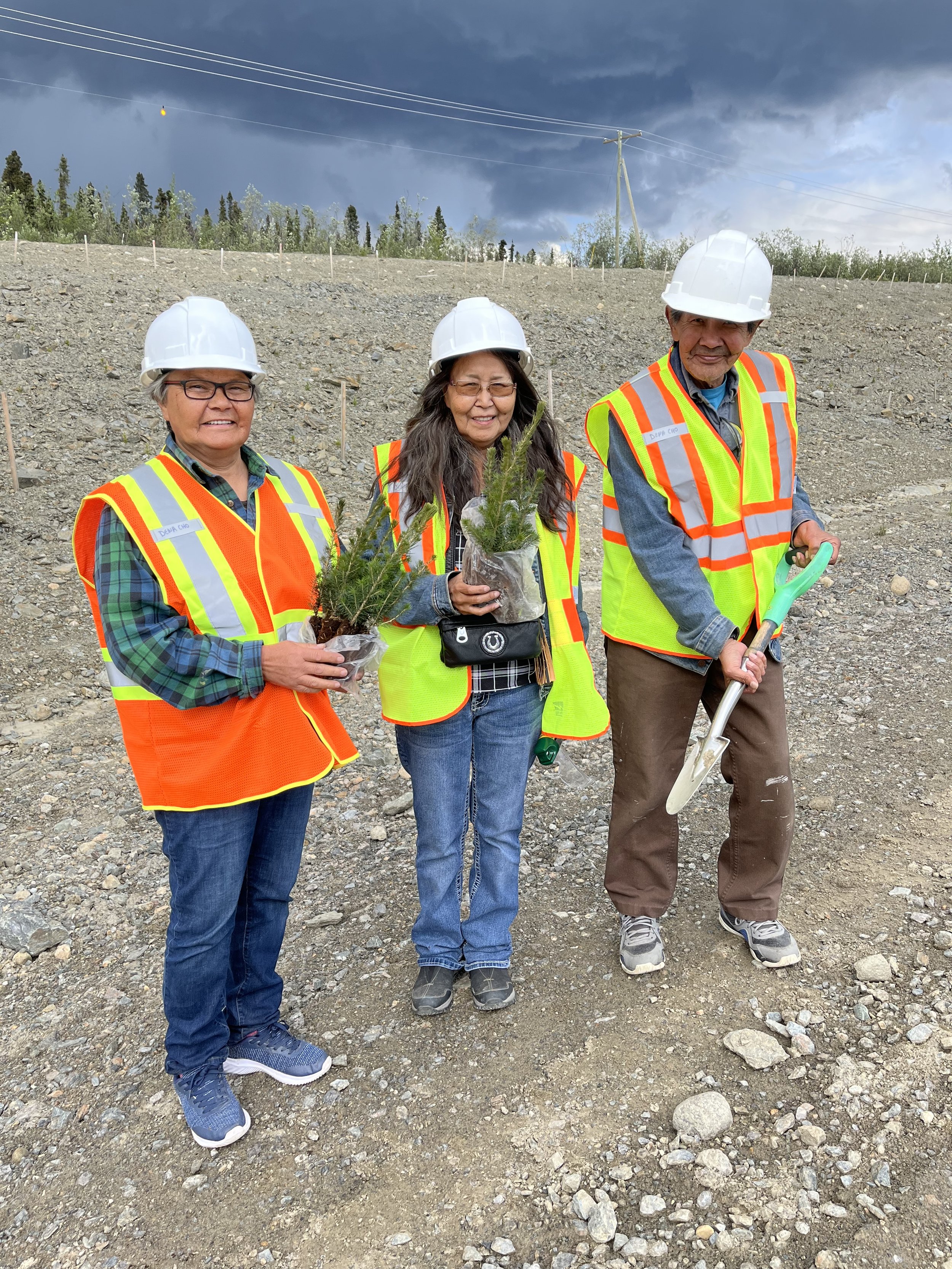
Elders Dorothy, Minnie, Louie visiting the tree planters (June 2022)

Kaska Elders Ted, Mary and Dorothy planting on rocky ground (June 2022)
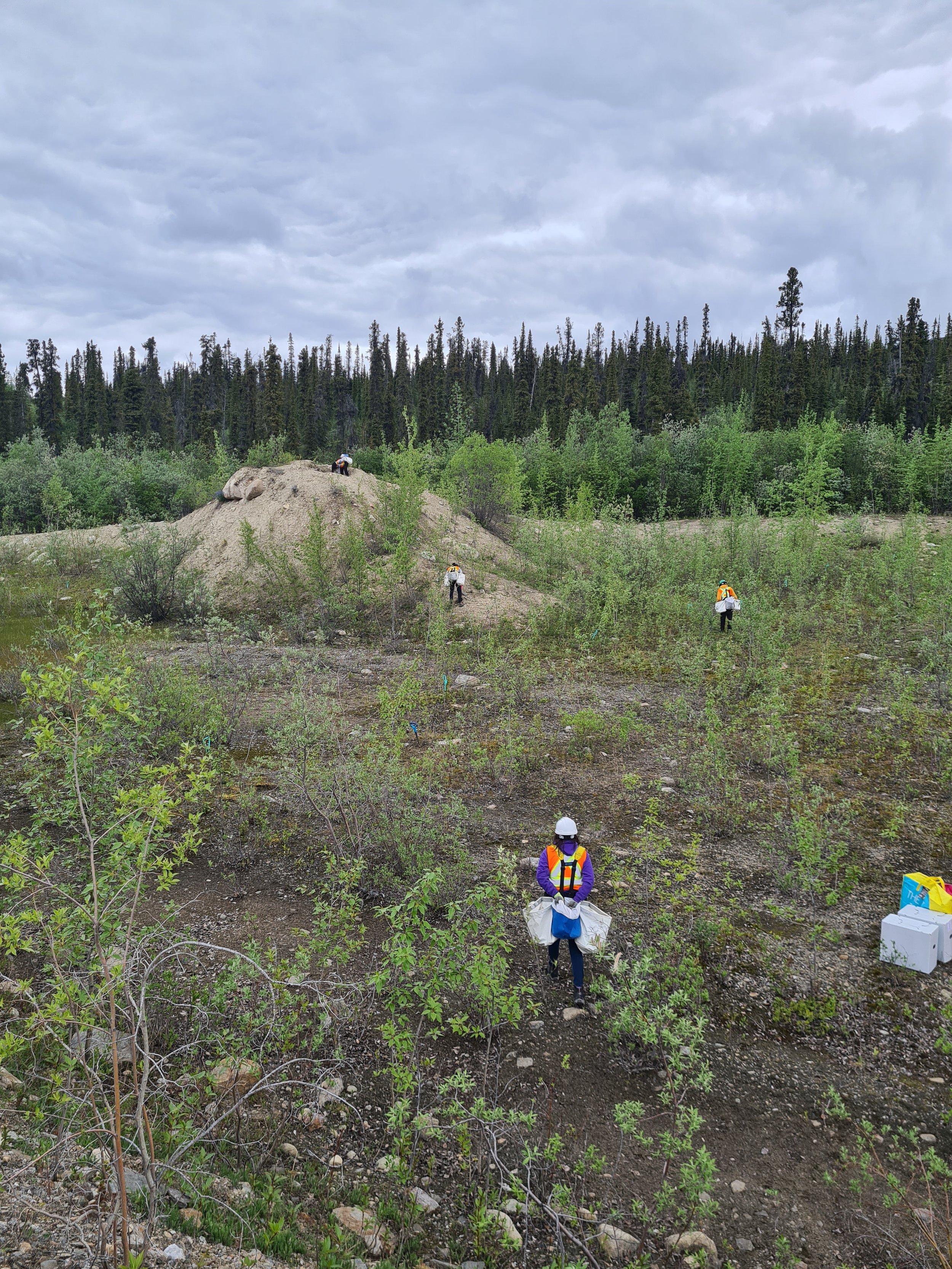
Tree planters heading out to plant (June 2022)
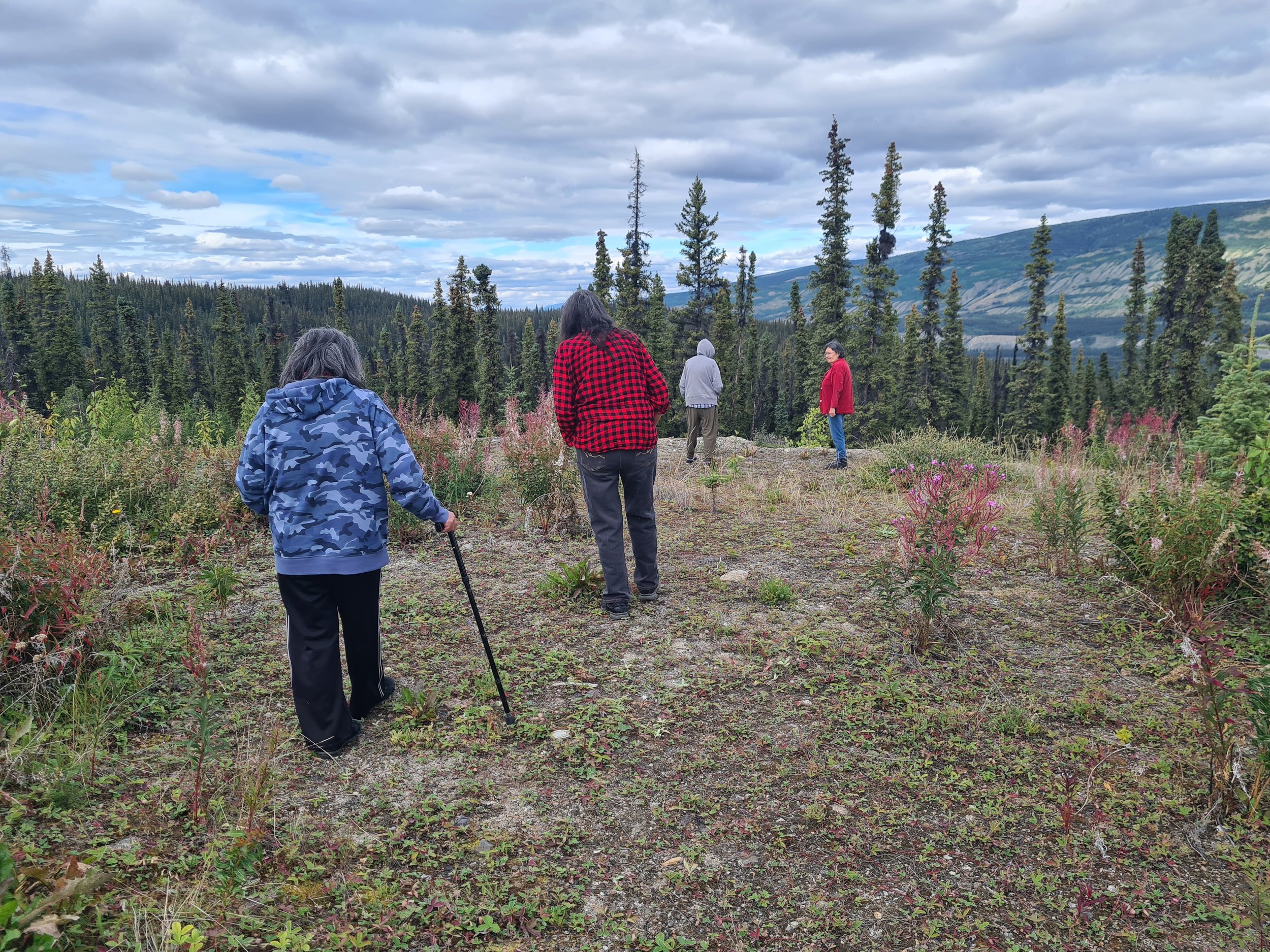
Start of the seed collection and metal uptake monitoring program. Collecting seeds and plant identification with Kaska elders (August 2022)

Gadze (lodgepole pine) seedling with fertilizer (June 2022)

IEG showing Elders and youth what plant species to collect (August 2022)

Jerry Ladue collecting catkins for the seed collection program (August 2022)
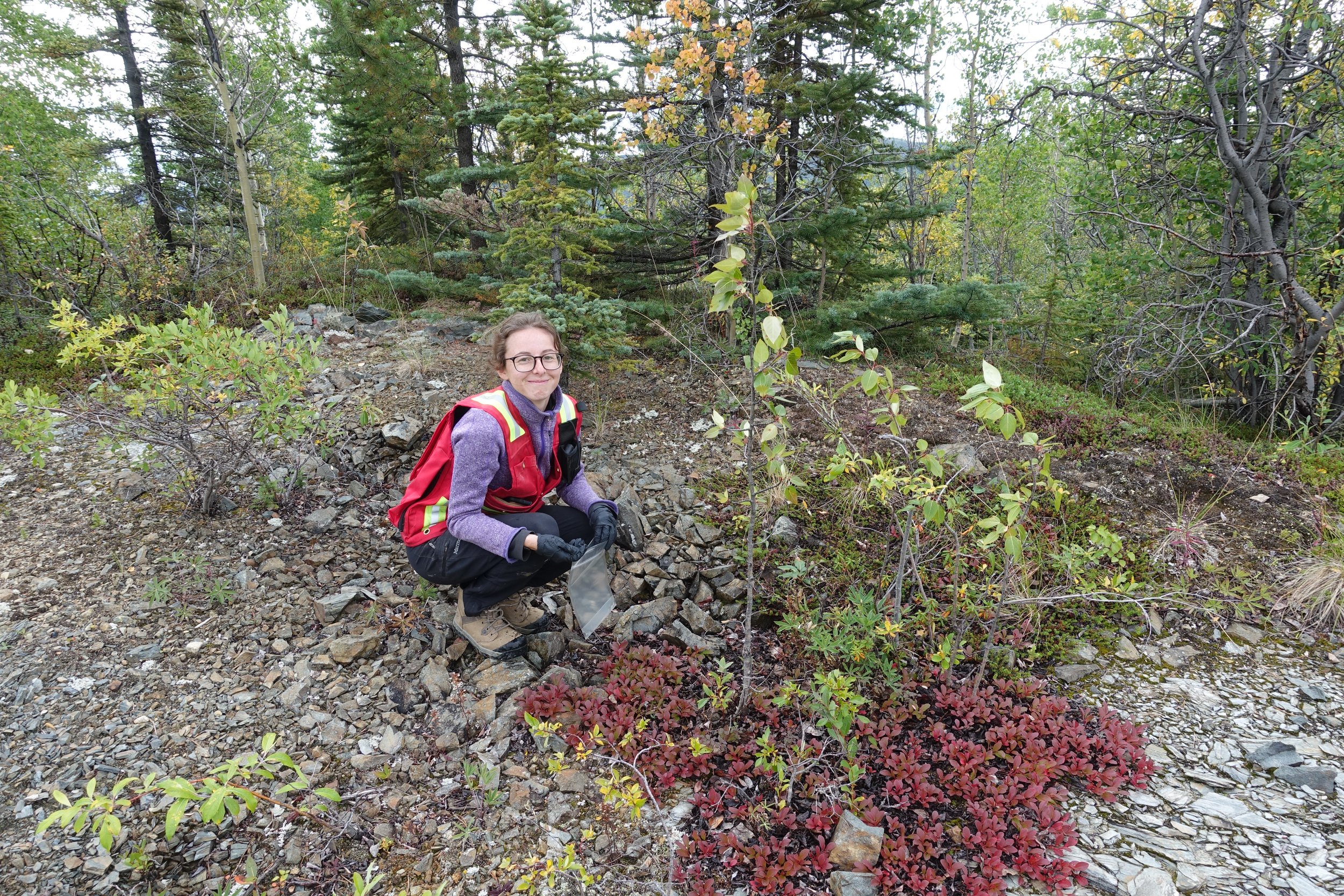
IEG Megan Spencer collecting red bearberry for the metal uptake monitoring program (June 2022)

Cassia, Camille, and Billy collecting for both plant programs (August 2022)

Caribou lichen and willow collected at Groundhog creek for the metal uptake monitoring program (August 2022)

Low-bush cranberry sample (August 2022)
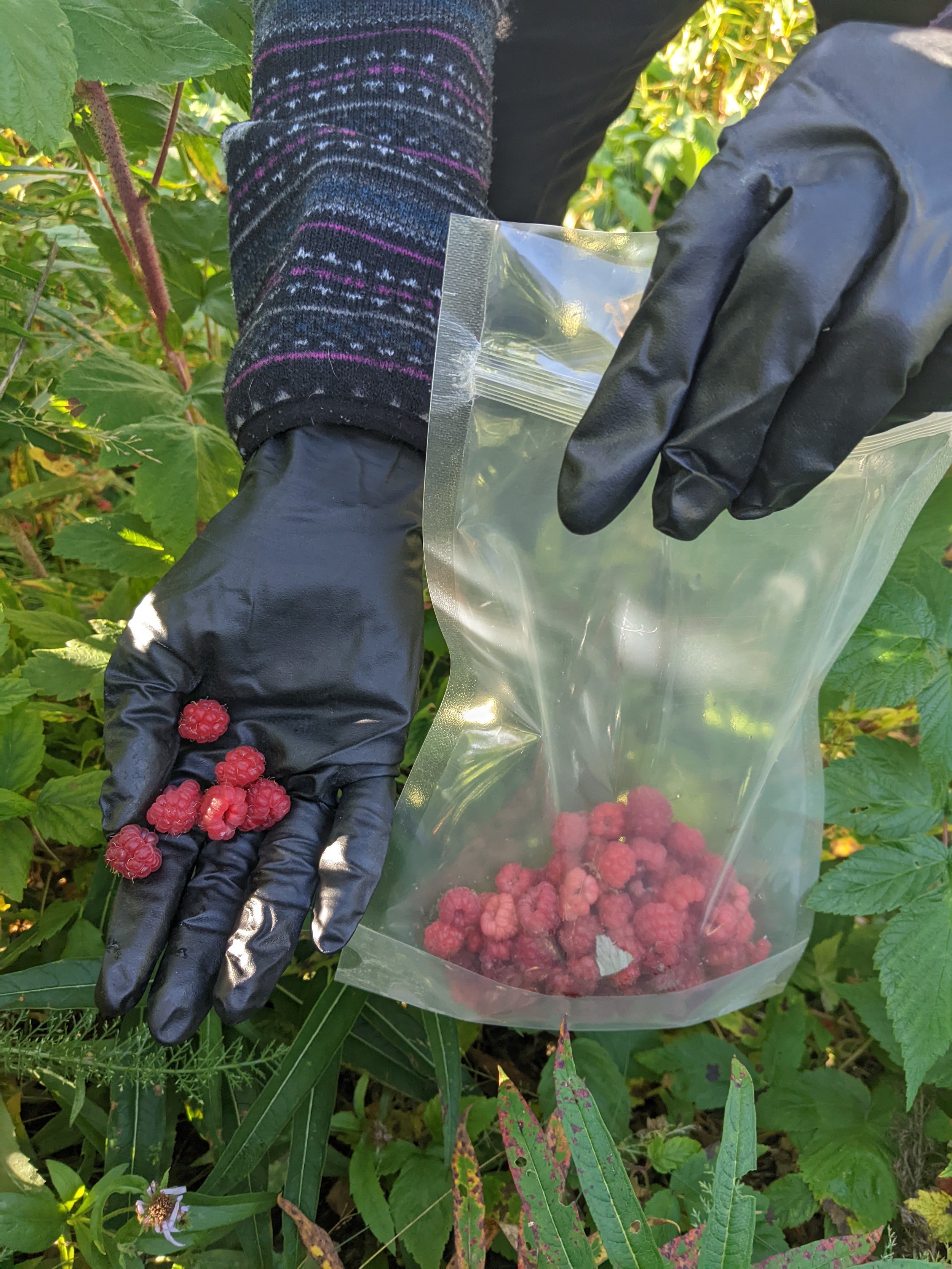
Raspberries collected with nitrile gloves and laboratory grade bags (August 2022)
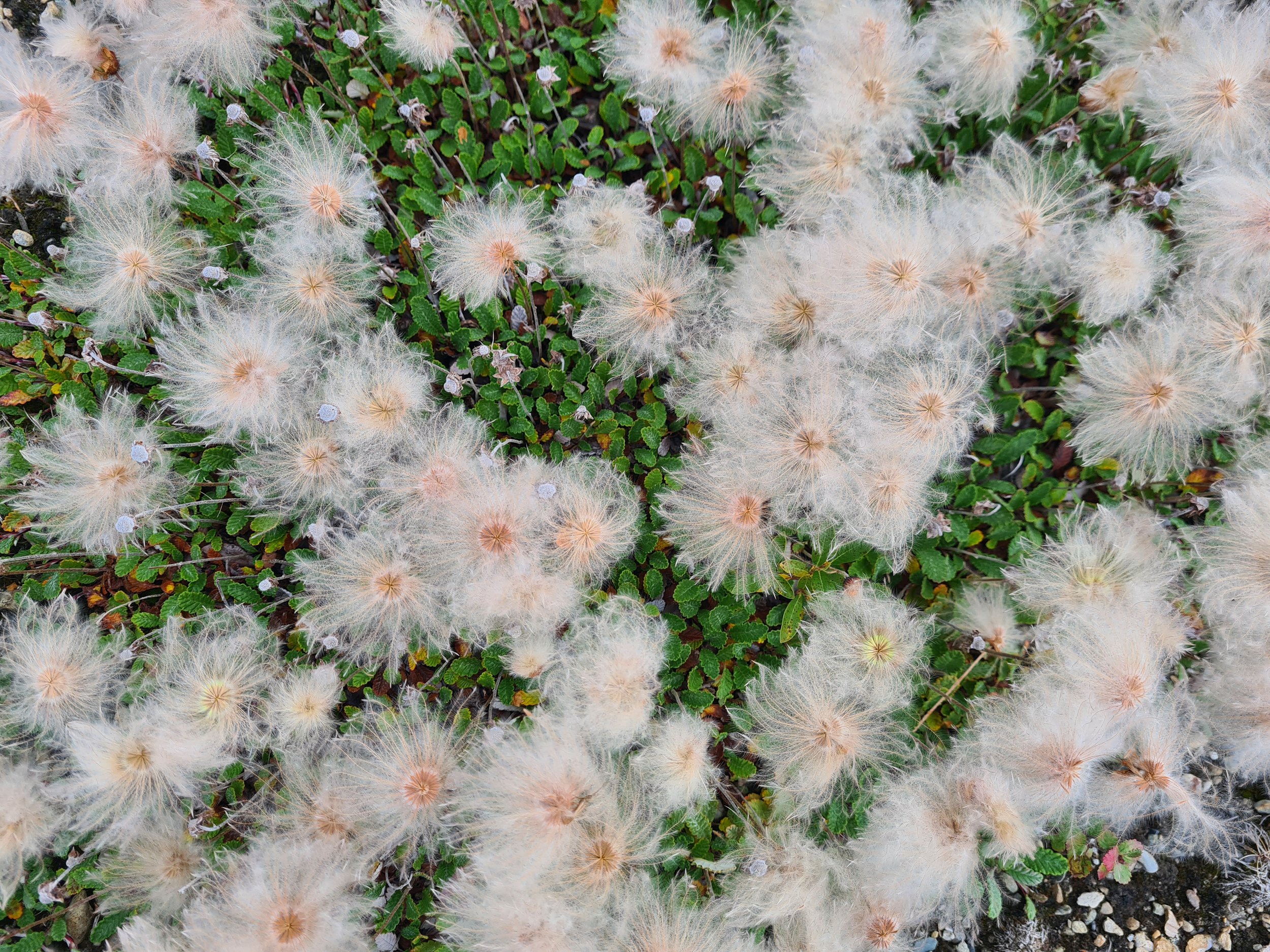
A nice patch of mountain avens (August 2022)

Collecting scrub birch catkins (August 2022)

Lunch break along the South Canol road (August 2022)

Cassia collecting red bearberry along the South Canol road (August 2022)

Lunch break at faro mine (August 2022)
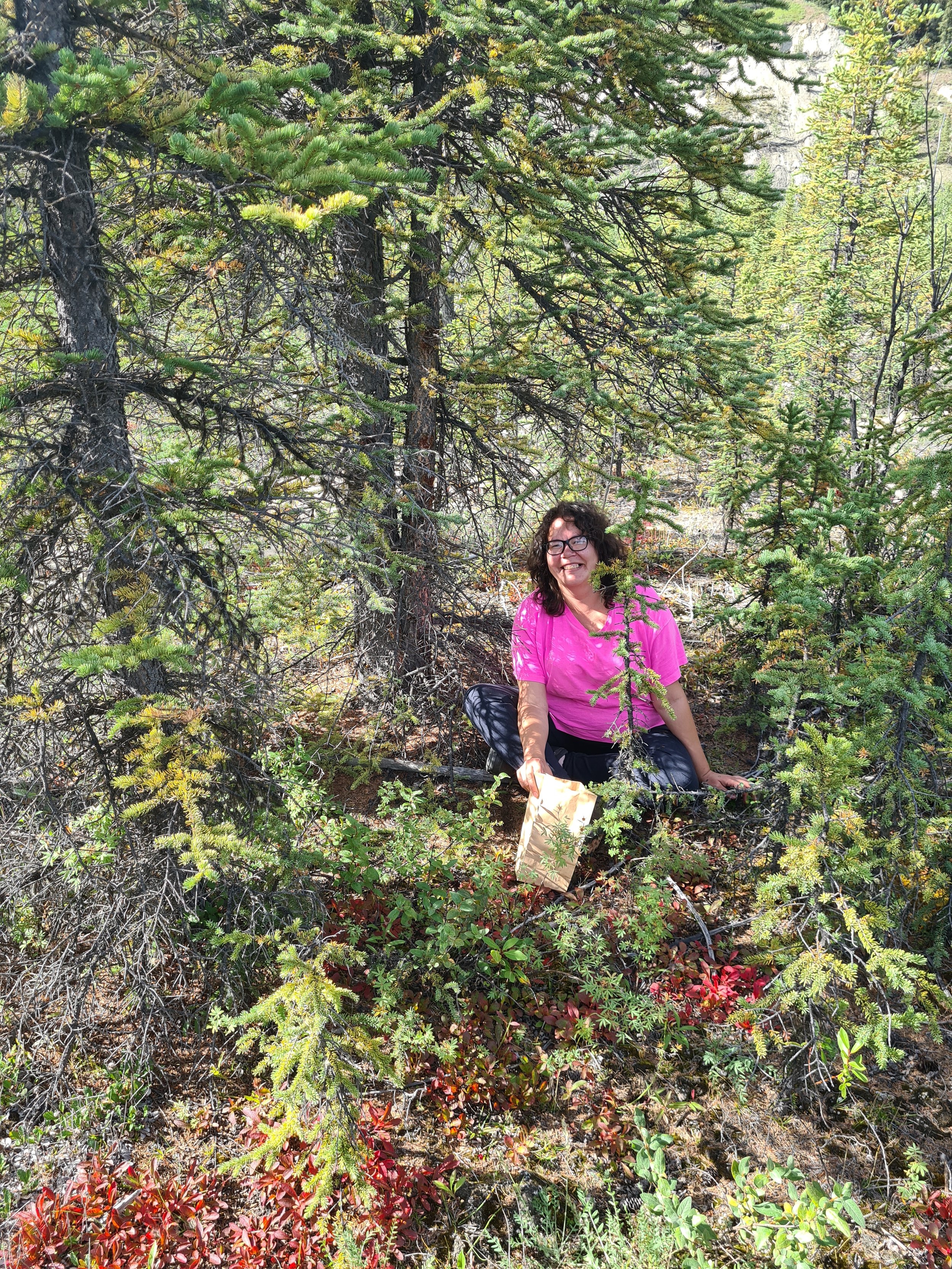
Billy Maje collecting seeds along the South Canol road (August 2022)

IEG's Justin Straker harvesting balsam for the metal uptake monitoring program (August 2022)

Elder Nora Ladue and Mary Maje collecting juniper for the seed collection program (August 2022)
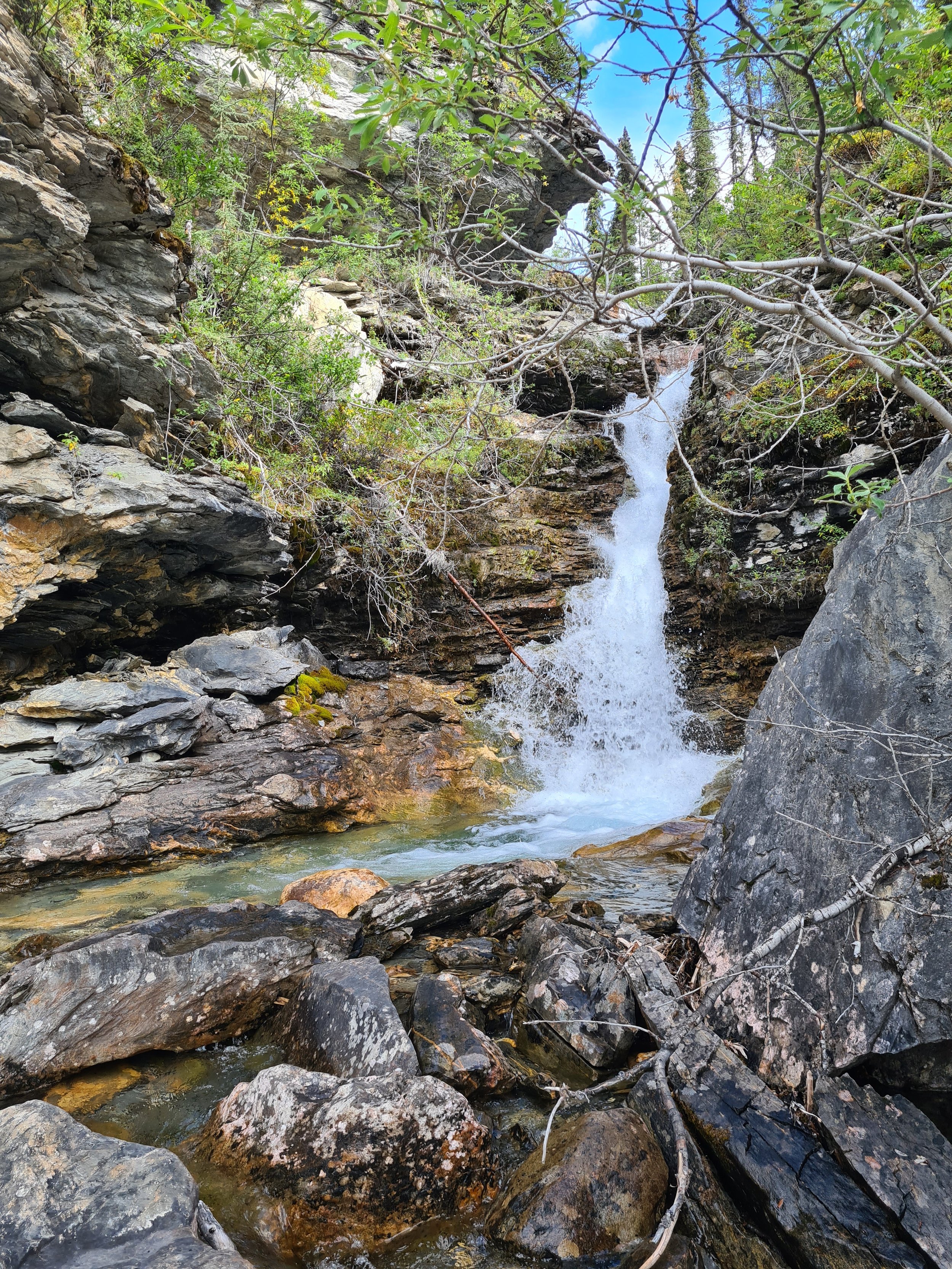
One of the prettiest collection sites: Ian H. Thomson falls (August 2022)

Elder Theresa Robinson collecting low-bush cranberries at Faro mine (August 2022)
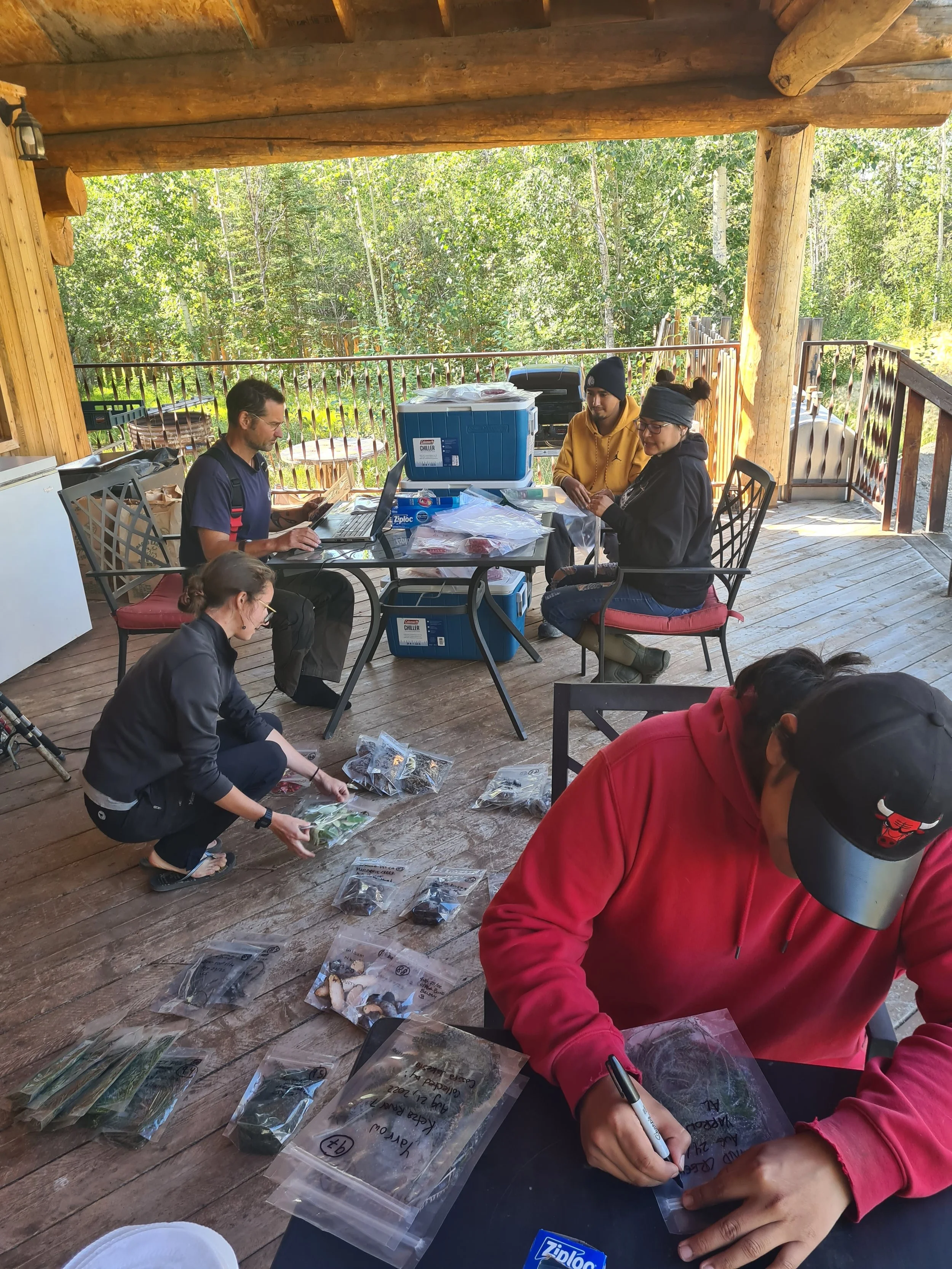
Labelling and organizing plant samples for shipping (August 2022)
